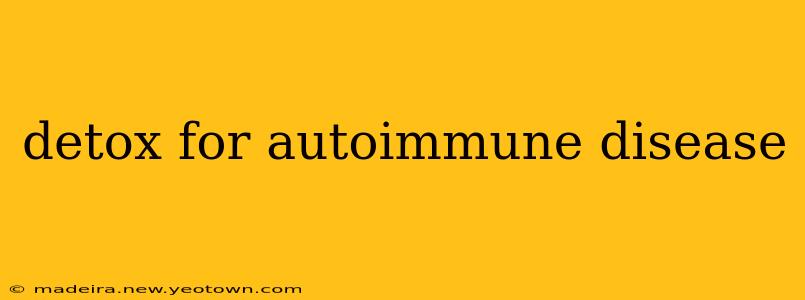The human body is a remarkable machine, constantly working to maintain balance and fight off invaders. But when this intricate system malfunctions, as it does in autoimmune diseases, the consequences can be debilitating. Many individuals suffering from autoimmune conditions like lupus, rheumatoid arthritis, or Hashimoto's thyroiditis explore various paths to manage their symptoms and improve their overall well-being. One such approach gaining traction is detoxification, but it's crucial to understand that a "detox" for autoimmune disease isn't a quick fix, but rather a holistic journey requiring careful consideration and guidance.
This isn't about juice cleanses or extreme elimination diets; it's about supporting your body's natural detoxification pathways to help it manage the underlying inflammation often associated with autoimmune disorders. This article explores the complexities of detoxification in the context of autoimmune disease, addressing common questions and emphasizing a balanced, sustainable approach.
What is Detoxification, and How Does it Relate to Autoimmune Disease?
Detoxification, in its simplest form, is the body's process of eliminating toxins. These toxins can range from environmental pollutants like pesticides and heavy metals to metabolic byproducts created within the body itself. In autoimmune diseases, where the immune system mistakenly attacks healthy tissues, the body is already under significant stress. This stress can lead to an accumulation of toxins and further inflammation, potentially exacerbating symptoms. A well-designed approach to detoxification aims to support the body's natural cleansing mechanisms—the liver, kidneys, and lymphatic system—allowing it to more effectively manage the existing burden and prevent further accumulation.
Is Detoxification Right for Me If I Have an Autoimmune Disease?
This is a crucial question, and the answer isn't a simple yes or no. While supporting your body's natural detoxification processes is beneficial for everyone, the approach needs to be tailored to your specific condition and health status. Aggressive or extreme detoxification methods can, in fact, be detrimental, triggering further immune responses. Therefore, consulting with a healthcare professional experienced in autoimmune diseases and integrative medicine is paramount. They can assess your individual needs, considering your specific diagnosis, symptoms, and overall health, before recommending any detoxification strategy.
What are the Best Detox Methods for Autoimmune Diseases?
There’s no one-size-fits-all approach. However, generally, gentler, supportive methods are preferred. These focus on nourishing the organs involved in detoxification and minimizing the exposure to further toxins. This typically involves:
-
Supporting Liver Function: The liver is the body's primary detoxification organ. Supporting its function through a nutrient-rich diet, including cruciferous vegetables (broccoli, cauliflower, kale), and avoiding alcohol and processed foods, is vital.
-
Optimizing Gut Health: The gut plays a significant role in overall health and detoxification. A healthy gut microbiome helps to eliminate toxins and reduces inflammation. Focusing on a diet rich in fiber and fermented foods, and possibly considering probiotics, can be beneficial. However, this should be done under medical supervision, as certain probiotics can be problematic for some autoimmune conditions.
-
Hydration: Adequate hydration is essential for flushing toxins from the body. Aim for plenty of clean, filtered water throughout the day.
-
Managing Stress: Stress significantly impacts the immune system. Implementing stress-reduction techniques like yoga, meditation, or spending time in nature can be immensely beneficial.
-
Gentle Movement: Regular, gentle exercise, such as walking or swimming, can support lymphatic drainage and overall detoxification.
-
Sleep: Prioritizing adequate sleep allows the body to repair and regenerate, supporting its detoxification processes.
What Foods Should I Avoid During a Detox for Autoimmune Disease?
Many common inflammatory foods can hinder the body's ability to detoxify effectively. It's often recommended to limit or avoid:
-
Processed Foods: High in unhealthy additives and preservatives.
-
Sugar: Contributes to inflammation.
-
Gluten: Can trigger inflammation in some individuals, particularly those with autoimmune conditions.
-
Dairy: Can be inflammatory for many.
-
Alcohol: Places extra stress on the liver.
-
Common Allergens: Identifying and minimizing exposure to personal food allergens is crucial.
Can I Use Supplements to Support Detoxification?
Some supplements may support detoxification pathways, but it’s crucial to use them under the guidance of a healthcare professional. Self-prescribing can be dangerous, especially with autoimmune conditions. A practitioner can assess your individual needs and recommend appropriate and safe supplementation, if needed.
Remember: Detoxification for autoimmune disease isn't a quick fix but a long-term commitment to supporting your body's natural healing processes. A holistic approach that combines dietary changes, lifestyle modifications, and stress management, guided by a healthcare professional, offers the best chance for sustained improvement. Always prioritize a personalized plan tailored to your specific needs and health status.

